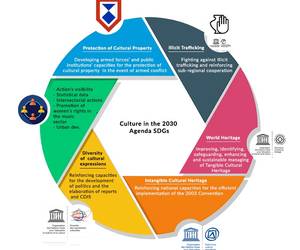Culture
From cultural heritage to creative industries, culture is both a catalyst and a driving force for the economic, social and environmental dimensions of sustainable development.
Since 2015, and for the first time, culture is part of the 2030 Agenda for Sustainable Development, which has devoted several strategic entry points to it, including the protection and promotion of heritage (SDG 11.4), Education, culture and sustainable development (SDG 4.7), or the production of local products (SDG 8.9, SDG 11b). Culture also occupies a prominent place within the Agenda 2063 of the African Union, notably in its Aspiration 5.
The SDG framework is particularly relevant to West Africa where the cultural sector is facing significant challenges related to the preservation and transmission of a diverse heritage weakened by conflicts, the rapid change of societies and an accelerated urban development. The culture sector also respond to the need of promoting the diversity of cultural expressions and creative industries through policies and support to the production of local contents by creators and cultural actors of the subregion.
Therefore, the UNESCO Dakar Office focuses on the protection and promotion of World Heritage sites, particularly in the event of armed conflicts, as well as on combating illicit trafficking. It also works on protecting and safeguarding the Intangible Cultural Heritage and supporting creative industries, building on the governance framework established within UNESCO's cultural conventions.




